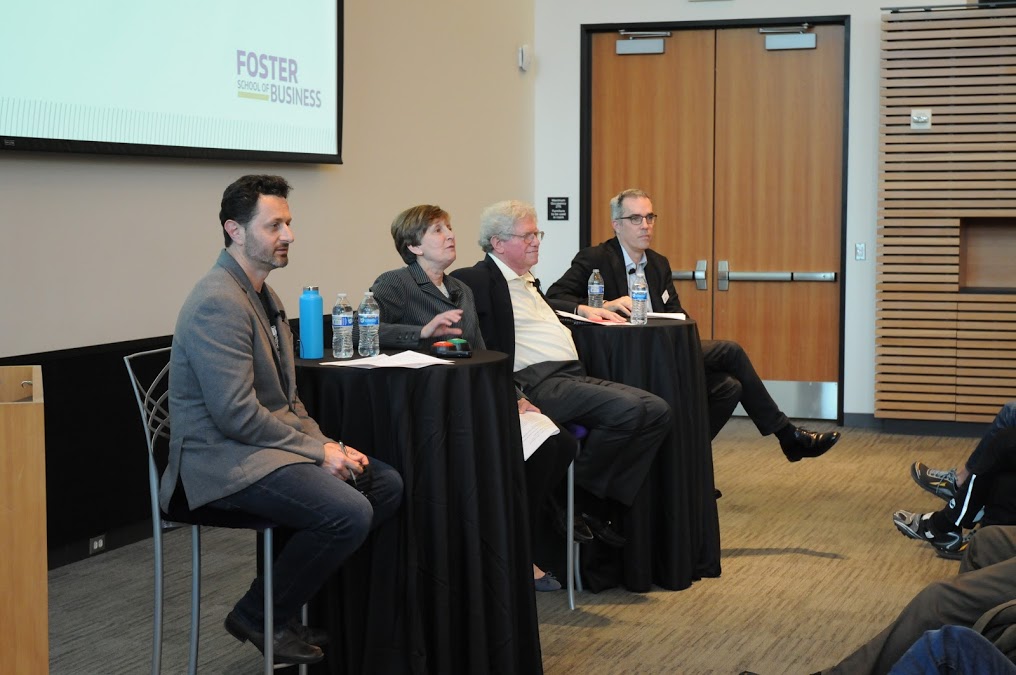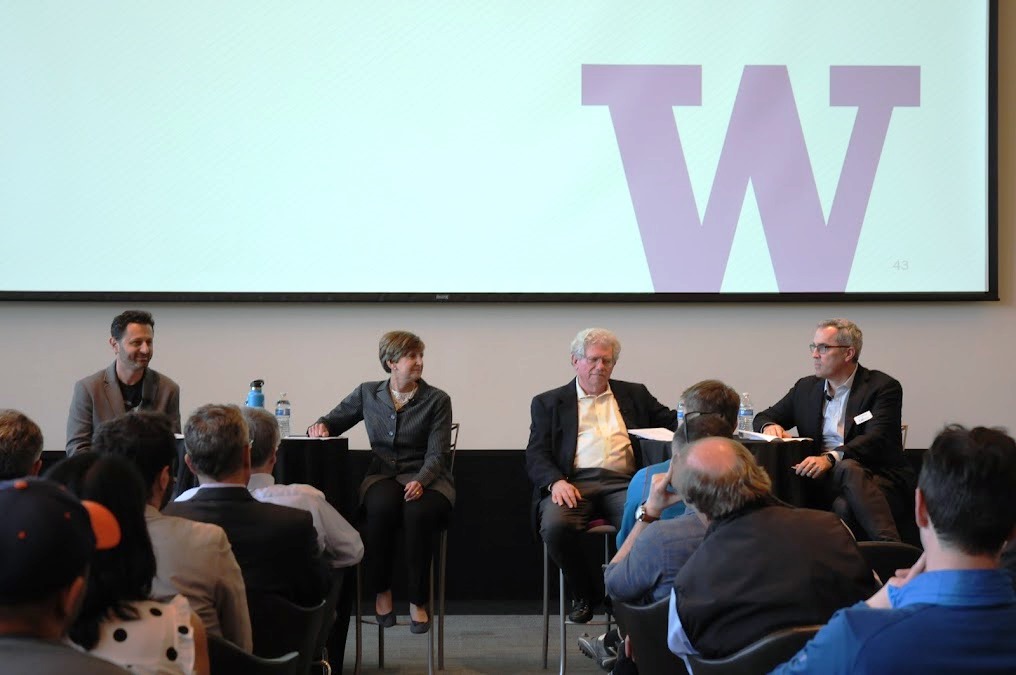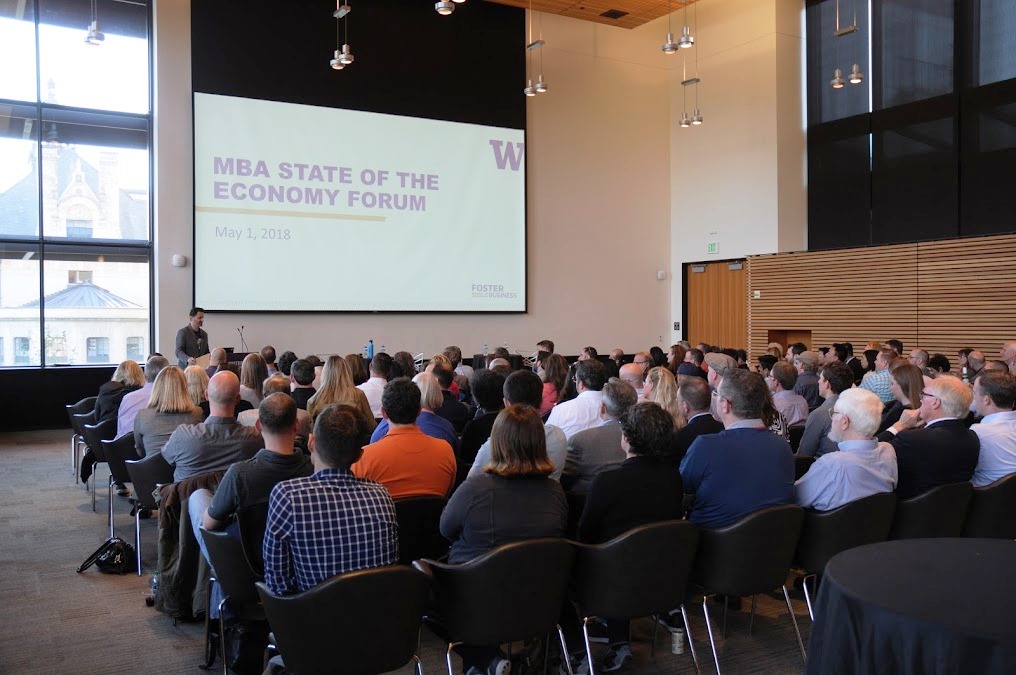Tax Cuts, Tariffs and Trade Wars: the 2018 MBA State of the Economy Forum
The state of the economy is… strong, but vulnerable.
That is, in a nutshell, the general prognosis of panelists at the Foster School’s annual MBA State of the Economy Forum held May 1 in Dempsey Hall.
Providing the economic expertise—tempered by some healthy doses of humor—were Ed Rice, associate professor of finance and business economics, Debra Glassman, senior lecturer of business economics, and Chris Mefford (MBA 2002), president and CEO of the economics consulting firm Community Attributes. Dennis Karlinsky (BA 2001), who leads the customer experience team at Microsoft Azure, was the evening’s moderator.
The panelists, drawing from audience questions, considered the titular hot topics in economics, with a few digressions into cryptocurrencies, chicken wars and Christmas trees.
So much anxiety
Mefford delivered a breezy preamble that illustrated economic trends of every stripe. “It’s a wacky time, with so much anxiety,” he said. “A lot of the data I’m going to share with you is meant to reduce some of that anxiety.”
He jogged through charts and graphs depicting everything from slow-and-steady global trading volumes to strong GDP growth to interest rates near historic lows to our ongoing economic expansion, the second longest in modern history. No signals of impending disaster lurked in these data.
More ominously, Mefford also charted the United States’s federal deficit at $665 billion and expected to hit $833 billion this year. “That’s an awful lot,” he said. “But it’s helpful to understand that it’s in the context of $20 trillion in output—almost a third of all global output. So that makes me breathe a little easier.”
What concerned him more was the rising rate of personal debt in this country.
Tax cuts
In kicking off a discussion on tax reform, Rice, a master of the metaphor, compared the federal tax code to a Christmas tree that gets increasingly festooned as it branches grow. He described the recent tax reform as a mere pruning of the existing tree rather than the overhaul he would have preferred. Many of the changes he dismissed as “stupid,” such as the 20 percent deduction of taxable pass-through business income which, he theorized, incentivizes him to become the “Ed Rice S-corporation, contracted by the University of Washington, so that I can reduce my taxable income by 20 percent…That’s not going to stay.”
What Rice does like is the reduction of the corporate tax rate, which brings the US in line with most of the world and provides a real incentive to keep corporate money at home. He also likes the move to a “territorial” corporate tax structure that only taxes income earned inside the US.
 Glassman took issue with the timing of the tax bill, voicing concern about installing this kind of expansionary tax cut when the nation is at or near full employment and the economy is already growing, albeit more slowly than most would like. “It’s the wrong time to add expansionary policy,” she said. “We may have an inflation problem as a result.”
Glassman took issue with the timing of the tax bill, voicing concern about installing this kind of expansionary tax cut when the nation is at or near full employment and the economy is already growing, albeit more slowly than most would like. “It’s the wrong time to add expansionary policy,” she said. “We may have an inflation problem as a result.”
And with still-low interest rates and rising national debt—much of it financed by foreigners–she fears there will be fewer economic levers available to address the next recession (which, by the way, she forecasts for early 2019).
“Lastly is the moral argument,” Glassman said. “Eventually this debt will have to be paid off, and it won’t be by us. It will be our children and grandchildren.”
Rice agreed, but pointed to government overspending as the real problem in the ballooning deficit.
Tariffs and trade wars
Discussion of the Trump Administration’s experiments in targeted tariffs drew the real wrath of Rice.
“Donald Trump has set back the discussion on trade roughly 250 years,” he said, suggesting the president has missed the central insight of Adam Smith’s seminal economics tome, “The Wealth of Nations”: that the a nation’s wealth and welfare is based on more than the amount of money it possesses.
Calling bilateral trade deficits “completely irrelevant,” Rice offered the relationship he has with his dry cleaner as allegory. “I pay my dry cleaner to get stuff clean,” he says. “So, I have a bilateral trade deficit with my dry cleaner, according to Donald. I’m just giving her money and she’s not giving me anything in return.”
“As much as I hate to admit it,” Glassman said, “I use Ed’s dry cleaning example all the time. He’s absolutely right.”
 She likened the application of targeted tariffs to extortion, a means of renegotiating existing trade agreements such as NAFTA. It’s not a new tactic, she said, despite its poor track record of success, from the protectionist Smoot-Hawley Tariff of 1930 (of “Ferris Bueller” fame) that exacerbated the Great Depression to the unintended consequences of the “Chicken War” that broke out in the mid-1960s between the US and Europe over a tax imposed on the importation of American poultry.
She likened the application of targeted tariffs to extortion, a means of renegotiating existing trade agreements such as NAFTA. It’s not a new tactic, she said, despite its poor track record of success, from the protectionist Smoot-Hawley Tariff of 1930 (of “Ferris Bueller” fame) that exacerbated the Great Depression to the unintended consequences of the “Chicken War” that broke out in the mid-1960s between the US and Europe over a tax imposed on the importation of American poultry.
“There’s a long-term danger of these targeted tariffs,” Glassman said. “For decades we have developed an international trading system with rules and institutions. It’s slow and it’s clunky. It has loopholes. However, it’s a system that a lot of countries have agreed to. I think the unilateral moves on the part of the administration have the potential to dismantle this system.”
Rice put it more emphatically. “Trade benefits everybody. It’s a win-win. The idea that we want to prevent it is crazy,” he said. “We should force these people to take my class.”
Cryptocurrency
As for the rise of Bitcoin and other virtual currencies, both Rice and Glassman professed skepticism of any currency without solid backing by the likes of a central bank. Glassman described the growing number of ICOs (initial currency offerings) as “a variation of crowdfunding, a way to raise money” and noted an increasing push for regulation.
Rice said he has softened his view on cryptocurrency just a bit, though he admitted that most of what he has learned is not good. “In particular, the assumptions behind Bitcoin working are like somebody who believed an economics course too much.”
He offered some simple advice, which really could extend to many areas of finance: “don’t invest in things you don’t understand.”


